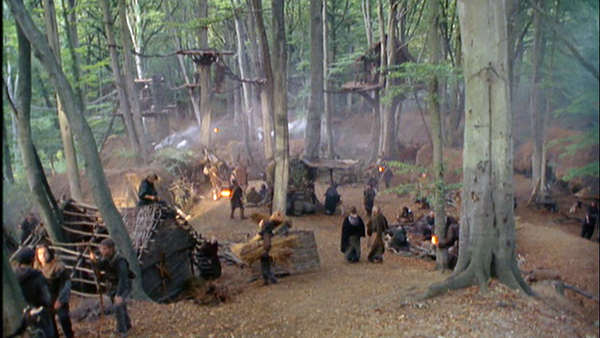So, yesterday, Bill Whittle came on my livestream and we talked about screen writing! Watch below!
These are the books Bill was talking about:
Screenplay: The Foundations of Screenwriting
Making a Good Script Great
So, yesterday, Bill Whittle came on my livestream and we talked about screen writing! Watch below!
These are the books Bill was talking about:
Screenplay: The Foundations of Screenwriting
Making a Good Script Great
No, I haven’t forgotten about this place. However — and I cannot overemphasize this enough — trying to explain Augustine, Anselm, and why they are both kind of idiots is incredibly difficult. That’s been my stumbling block for months and that’s why there haven’t been any updates.
Add in that I am currently looking for work and I just haven’t been able to find the time or energy to study history while I’m trying to figure out how I’m going to pay my bills and you’ve got a pretty good picture of how things are.
That said, hopefully I will find something soon and will be back to explain why Augustine, even though he is a Church Father, is also a ginormous idiot.
— G.K.
This will be a new series about how storytelling is done in video games. As I learn more about programming and as I think about video games I have played over my lifetime, I will be making new posts to explore the dynamics of gameplay, storytelling, and graphics. Right now, I am working up a post about the Uncanny Valley effect and modern games — mostly those by Square Enix. If you know of games that have successfully crossed the Uncanny Valley, post the titles in the comments below and I will check them out as time and funds permit.
This is going to be a very long, somewhat rambling, and at times incoherent series of posts as I learn more about programming in general, game programming in specific, and the history of gaming.
I hope that you who still read this site will enjoy it! If you have suggestions or questions, post them in the comments.
— G.K.
It’s been a while since I posted anything here. A lot has happened in my life since the last time I posted. Back then, I was engaged. In the years since, my engagement ended somewhat abruptly. Oh, it’s all my fault. I wasn’t good enough, I wasn’t what my fiancé needed when he got sick, and I was too stupid and stressed to be the woman he deserves. I hope that, one day, he’ll find someone worthy of him. For myself, I’ve decided to return to my fictosexuality and only fall in love with fictional characters. I will not seek to enter a relationship with a real man ever again. It seems that, somewhat tragically, I got it right the first time around when I married my ex-husband. Since there is no chance of us ever being anything other than good friends, I’m giving up on romance entirely to focus on my career and my writing.
That leads me to the next bit I have to announce. Back in 2017, under some pressure, I became a teacher. I have taught high school and elementary English and French over the past three years and I have learned a valuable lesson: I am not cut out to be a teacher. I’m too introverted, a few standard deviations too distant, and just too much of an INTJ to be a good teacher. Especially in the impoverished districts that are hiring. Therefore, I will be returning to the IT world as a web programmer. I already have a position lined up for me.
So, why am I giving up teaching? Simple. I’m no good at it. Oh, I can reach most students — that’s true. I can break down concepts and get my students to understand them. I can teach. The problem is — I can’t inspire. I can’t make connections with most of my students. Part of this is down to me being an INTJ — we don’t make connections with anyone easily. The other parts come down to me being a very different generation, class, and race than my students.
See, I graduated from high school back in 1998. Back then, students were expected to just do whatever the teacher asked. There was no arguing. There was no getting Mom and Dad to come up and defend us for being special little snowflakes. It was “do the assignment or take the zero.” If we wound up in a class we didn’t want to take or didn’t have the pre-reqs to take (as happened to me my senior year when I landed in Trigonometry after having eked out a “D” in Algebra II), we were expected to give it our best regardless. None of us thought about complaining that we didn’t understand, that we didn’t want to be there, that we were bored, that we hated the class. Our thoughts, feelings, and opinions were completely irrelevant. We were expected to do the work, to give it our all, and to go along to get along regardless of whether we wanted to be there or not. If we were ill-brought-up enough to complain, we got sent to the principal’s office and there we got set straight that what we wanted did not matter at all and that life would never conform to what we wanted or wished.
I could go on and on — and will, probably, in a different series of posts — about the problems with modern students and the current education system. However, for now, all you need to know is this: do not become a teacher. Unless you feel the same level of calling to be a teacher that some feel to become a priest, a nun, or a pastor — don’t. Why?
Well, first of all, being a teacher is a lot like being in an abusive relationship. Unless you are prepared for it and have the kind of personality that is able to withstand the abuse, it’s not worth it. You will rarely ever hear anything positive. Your academic coaches and principals will instead focus only on test scores, absences, and lack of willingness to follow arbitrary rules that you will be held to while their favorites and they themselves will be exempt from upholding. You might manage to come in every single day — even on days that you are ill — but you will be yelled at and held to account for all of the teachers who don’t come in every day. Your test scores might be in the highest percentile for the school — but you will still be shouted at as if you were in the lowest percentile. And God help you if you have troubled students. For every write-up you send to the office, not only will nothing be done, but you’ll be considered a “bad” teacher who is “unable or unwilling” to control your class.
If your students threaten you, you will be ignored when you report it. If they complain and make up a whole lot of crap about you, they’ll be believed and you will be ignored. If you start to record them, you’ll be in trouble. If you can’t keep 100% of your students 100% engaged, then the problem is with you.
You will be told to “teach to the test.” However, when you do that and your students go off to college completely unprepared for the rigors of university-level courses, you will be blamed for “teaching to the test.” Even if you record your principals demanding that you do just that (teach to the test), you will be held accountable when your students aren’t college-ready. Your principals and department heads will throw you under the bus. You will have no support, no back-up, no authority, and no respect from your students, their parents, or your administration. Instead, you will be the first to blame for any problem, for any issue with other teachers in your department, for anything that has annoyed the administration. You will work at least 30 to 50 hours overtime (unpaid!) per week. You will sacrifice time with your spouse, with your children, for your hobbies — all to try to make the administrators look better. If, through your sacrifices and efforts, the school does start to do better, you will NEVER be given credit. Instead, it will be the superintendents and principals who get the credit.
Everyone will talk about how lucky you are to have so many paid holidays — ignoring the fact that you forgo several hundred dollars per month so that your paycheck can be stretched from 10 months to 12 — and that the amount will always favor the school district and not you (after all, you might think that $48,000 would mean $4k per month but no, it will get you around $3k per month after benefits, withholding, retirement, and whatever other tricks your district comes up with). You will spend most of those holidays working — trying desperately to keep ahead of the demands. Should you be lucky enough to make it five or more years in teaching, you will find yourself forced to kowtow to the whims of an idiot who brags about not bothering to teach third-graders how to read but instead managed to get their test scores higher.
You will work, you will slave, you will sacrifice, and you will give and you will be told that all of that is not enough. You will never hear a single positive thing. You will be blamed for everything that goes wrong. You will be held accountable for all of the students who just got passed along until they got to you. You might be teaching 12th grade with students who are on a pre-K reading level and it will be YOUR FAULT that they can’t struggle through Beowulf or Macbeth. Never you mind that their previous teachers promoted them because it was easier to 60 them out than to deal with the paperwork. It’s still your fault that they got to you unable to read on grade level.
And your paycheck and benefits? Sure, if you manage to suffer through 30+ years, you’ll get a good retirement package. Unless, of course, the State needs that money to fund something else.
In short: entering into education is stupid. It’s like willingly getting into a relationship with a drunk who has a history of beating their partners. Only do it if you enjoy being a martyr. If you have an ounce of self-respect, go into something else. You’ll not only work less hours, have more time to yourself, and get paid more — you’ll add years to your life.
From one who has survived three years of absolute hell,
— G.K. Masterson
It should come as no surprise that I like a good bit of speculative fiction that is a bit heavier on the science than filled with handwavium. Therefore, when I stumbled across Jeb Kennison’s The Substrate Wars series, I was hooked. The first book in the trilogy, Red Queen, is definitely worth a read if you haven’t checked it out yet.
The series starts following a nuclear attack on Manhattan that led to a single party pretty much dominating American politics. The premise is not too far fetched and shows some of the problems that can come from having a political monoculture in universities and the media. A rebellious group of college students gets together and through a breakthrough in technology, develop a way to get away from the oppressive environments on Earth.

The books are short and the characters, while somewhat Mary-Sue-ish, are still likeable and believable. If you’re looking for a good adventure in sci-fi that deals with technology that we would actually recognize, then this trilogy is definitely worth the $7.00 all three books will cost you. I give it a solid three-and-a-half rainbow farting zebricorns. It loses one-and-a-half for the Mary-Sue characters and the black-and-white nature of the way it treats the good guys and the bad guys. Still, it’s readable and well worth the time.




— G.K.
Okay, so after everything you’ve already considered, it’s time to start looking into the major institutions in your primary society and any in secondary societies you’re planning to have your characters interact with. The biggies are government, social classes, and individual institutions. If you’ve managed to stay awake through most of your high school history classes, you’ll already have a fairly good idea of most of the major forms of government and variations you can make on them so I’m not going to spend a lot of time on that. Social classes will generally tend to flow from both your form of government so I’m going to let those pass for now as well. However, individual institutions are where you can have the most fun.
The family unit is the primary individual institution. What is marriage like in your world? Is it a religious thing? A cultural thing? A contractual arrangement? Do you have two-party marriage only? Polygamy? Do you allow for multiple wives and multiple husbands? Can you have both in a multi-party marriage? Are they all married to everyone else involved or is it strictly only to those they wanted to marry with? How are children reared in a family? Is divorce or separation allowed? In what cases?
After the family comes the guild or tribe/clan structure. Do you have guilds for different professions? All or particular ones? Is membership required or optional? How are small towns or villages governed? Larger towns or small cities? Is there a religion? More than one? How intertwined is it with the government? What is the priest class like?
Then there’s the individual economic sphere to consider. Are there shops? Are they large or small? Single-product or multi? Is there an open air market? Is it daily, weekly, monthly? Are prices set or is haggling allowed? What about medical treatments? Are there hospitals or do priests handle the healing? Does your world have plagues and outbreaks that force quarantine?
How are crimes handled? Is there a professional police force? Trial by judge or jury or both? How is evidence given or collected? What’s allowed as evidence? Are there formal rules or is it informal? Are there jails? Are convicts sold into slavery? Executed? Branded? Some other punishment?
Finally, are individuals allowed to travel across national boundaries without needing any kind of permission or is travel pretty much free and open? What about settling abroad? Can someone born in nation A become a citizen or subject in nation B? What are the requirements?
You actually will find yourself having to deal with almost all of these as you write. Even if you’re not planning on doing a lot of world building, these kinds of things will show up in your story. Since almost every story is about individuals, you are going to see more individual institutions in play through a narrative than you will major institutions (though you do still need to keep tabs on those).
Next week we’ll step away from world building a bit to look at how others have done it and what they’ve done well and what aspects could use some work.
— G.K.
Most of you who know me know that I did my undergrad degree in history and Classical languages. However, I don’t think I’ve ever done a book review of one of the history books or biographies I’ve read (and I have more than a few in my library). That’s going to change this week. Just recently, I read Dan Jones’s Magna Carta: The Birth of Liberty. If you’re interested in British or American history, this book is a good one to add to your list. It does a great job of covering the problems that King John created with his misrule of England and his off-and-on wars to try to win back territories his brother Richard held on the continent. The focus of the book is on King John and, in many ways, it could be considered more a history of his reign than a treatise on the Magna Carta itself.

That said, Jones does a great job of explaining the history and the attitudes of the English nobility that gave rise to the creation of the Magna Carta. Where most other European countries had less liberty accorded to the nobles, the English had a lengthy history of certain prerogatives among the nobles and restrictions on what the king could do. Jones does a good job of explaining what those were and why the nobility were so upset over John transgressing the boundaries of “acceptable” behavior for a king.
Overall, if you’re interested in learning more about the last of the Plantagenet kings and the first major document drawn up to place checks on the sovereign — a concept that would later be expanded upon both in the United Kingdom and the United States — this book is a great place to start. It earns a solid four out of five rainbow-farting zebricorns for its comprehensive coverage of the topic and its approachability for the non-historian.




— G.K.
So far we’ve covered the preparing, surviving the early days, getting out of Dodge, who to save (or invite) for your group and who not to, and what kind of groups you’ll run into. Now let’s talk about how to decide where to set up your group’s base of operations so you can ride out the zombie apocalypse in relative safety, good health, and quiet with an eye towards re-establishing order and a stable (and sane) social base. You’ll want to do this in at least three stages because trying to do it all at once will be virtually impossible.
Firstly, look for a place that is almost already secure but would be passed over by most groups because it’s psychologically tarnished. Do not go after valuable or historically significant landmarks here. Look for prisons, abandoned armories, schools with fences or palisades (the modern high school, architecturally and structurally, differs little from a prison), state mental institutions, old forts, trailer parks, or vast stretches of farm lands surrounded by forests. Depending on which you find, your security details will be different. Avoid residential areas, suburbs, clusters of homes close together, neighborhoods and subdivisions, hospitals, historic landmarks, or areas of any cultural significance.
Prisons, armories, schools, mental institutions, and forts will all have pre-built fences. They’ll usually be double-rows of fences along the outer perimeter with another internal double-row around the buildings. There will be guard towers, look-out points, and the access roads will be easy to cut (meaning you can control access to and from the area). However, they will generally be passed over because these places are not built for comfort or privacy. You may have to clear any zombies inside them but if no one else has claimed the place, take it and make it your own. You can use its own defenses to help you take it over with a little careful planning.
Trailer parks can be easily secured by dragging the trailers closer together (don’t worry about the electrical access because, by this point, it’s shot with the grid down) or by selecting a few trailers near each other and using others as watch-out points. A rural area where you can see for a good distance is also a wise choice since you can secure a small area within it to live and let the rest act as a barrier.
Why pick these places? Because they have negative psychological value. No warlord or tin-penny dictators are going to want them. No restorers are going to fight you over them. You are deliberately choosing a shit-house (but a defensible shit-house) over a mansion because doing that gives you a greater chance of being ignored by the living while letting you focus your energy on defending against the zombies.
This is phase one. Phase two is finding some place that doesn’t suck quite so much.
With your first secure area down, start scouting for a place nearby that has access to a source of running water (a river is ideal), farm-able land, and forests with a lot of mature trees. You no longer care about how accessible it is by car — the further it is from any road, the better, actually. You’re going to be doing some very intensive subsistence-level farming and, if you’re in the South, you can probably feed about five people per one acre of farm-able land. Now, the fun part is that the land doesn’t have to be where you’re going to live — it just needs to be within a two hours’ walk. No, you’re going to live in the forest.
Specifically, up in the. damn. trees.

This is the part that drives me up the wall whenever I watch The Walking Dead. They spend so much time securing the prison. They spend so much time trying to repair those fences. They spend so much time building fucking walls and it’s stupid. I’m waiting for my man Daryl to have a light bulb moment and say “Hey, Rick…the dead can’t climb trees. Hell, they can’t climb ladders. Why in the hell are we living on the ground? Let’s build a bunch of tree houses all Robin Hood: Prince of Thieves style and be done with it.”

Seriously, I’m sure there’s some equation to demonstrate this but the larger the perimeter’s surface (re: the circumference of the fence) then the more zombies can surround it and the greater force they can enact upon it. Hell, they don’t even have to surround the thing, just get a sufficient mass at one point and the force will cause that point to buckle. One entry point does lead to a cascade of failure points as the herd forces its was through their opening, sending shockwaves and vibrations through the weakened fence. You’d have to bury half the damned fence, making it twice as “tall,” to diminish this and it would still eventually happen. (Physics peeps and math peeps can probably back me up here).
Trees, on the other hand, evolved to deal with this kind of crap because they had to put up with the wind and floods and thunderstorms and tornadoes. The circumference of a tree trunk is not sufficiently large for a herd to cluster around it in great enough numbers to build up the momentum and energy they would need to knock the tree over. Factor in the root structure and the fact that, for all that trees seem rigid to us, they’re really flexible, and you’re a chump if you’ve not moved back into them during the zombie apocalypse!
So, to kick off stage three, select your forest near a river, not too far from where you’ll be farming. Then start digging a deep trench from the river around the initial “city trees” you’ll be building in. Instant moat. Outside of that, dig another series of staggered trenches and line them with spikes. Cover that stuff with branches. Pit traps. Inside the moat, build a fucking double palisade and inside the gap — another trench with spikes. Then start building your homes up in the trees and connect them with suspension bridges. You can use waterwheels and modified aqueducts to get water from the river up to the tree-house level. You’ll probably want to look into building a “public” bathing house and setting up latrines outside of each house (use soil to absorb the “leavings” and guess what? You have fertilizer!) You can keep domesticated animals inside the palisade and, since you’re living in the forest now, hunting is easier.
Once that’s done, expanding your settlement to include more “city trees” is easy and does not require expanding the moat or palisade.
The great thing about this is that no one is going to want this set up. Restorers won’t go for it, warlords won’t want it (too damn much work). Scumbags would have a hell of a time finding it, let alone getting in. Your community will be forced to work together doing some fairly back breaking labor (don’t wax poetic to me about the nobility of subsistence farming. My great grand-daddy was a subsistence farmer). That will help you weed out trouble-makers and idiots. However, with this set up, you will have some leisure time and you may be able to spare some resources if you have happened upon some lone wolf types who are like Milton Mamet and would be wasted in the fields but could instead invent ways to generate electricity or improve aqueducts or the like.
Another bonus — everyone can sleep a full night. The rest will help out a lot in terms of health, energy, and cooperation. Since you don’t have to worry about the zombies breaking in since they can’t climb up and get you, you don’t have to post guard as much. You’ll still need some guards but they’ll be mostly watching for humans, not zombies.
In your own tree fort city of awesome, you can begin planning how to reach out to others, get news of what else is going on in the world, and start rebuilding a civilization. We’ll touch on that next time!
— G.K.
but, by God, I am anti-gatekeeper.
I can remember being a teenager and being told that I would need to write things that the publishers wanted to sell. I understood that — to some extent. I understood that it would mean lying. I understood that it would mean not digging for the deeper truths. I understood that it would mean kissing the lily-livered asses of a bunch of damned Yankees (as distinct from just plain “Yankee”) elitist rich liberals who had never written an actual sentence of their own. And I hated that.
Understand this — the publishing industry in the United States consists of an incestuous group of NYC-born and bred “editors” who barely speak English. It consists of a bunch of people who went to the “right” schools. Who made friends with the “right” people. Who were born in (or fucked their way into) the “right” beds. None of them have a modicum of intellect. I honestly doubt that the vast majority of them could pass the FLE (Functional Literacy Exam). Instead, they’re related, by sex (oral, anal, or vaginal) to the “right” people. They have the “right” pedigrees. They went to the “right” schools. Most of them have never set foot outside the protective confines of upper-class New England. Most of them have never worked an honest job a day in their lives. Most of them couldn’t tell you which foot pedal was the breaking pedal and which was the bleedin’ accelerator, let alone change their oil own or light bulbs. These are the kind of people who, once society shits itself, will be the first to die because they’re too damned stupid to live.
And yet, they’re the ones we have allowed to decide who will be published and who will die unknown.
At least, until indie-publishing became a worthy challenge. And they hate it when someone without their Papal imprimatur makes a fortune without having kissed their feet and arses. It drives them up a wall they they rejected authors like J.K. Rowling and yet — love her or loathe her — she sits upon a fortune not granted by these limousine liberals. They hate it every time an indie author makes their way to the top of the Amazon best seller list. How dare we indie authors not seek their blessing upon our work? How dare anyone write a story that doesn’t adhere to their orthodoxy? How dare we tell them “let the readers decide?”
Such blasphemy! After all, weren’t they born in the skyscrapers of NYC to divine the fate of all authors? By their white skin and their quasi-Marxist credo (which, of course, leaves them as the elite destined to rule over all mankind), they were chosen to determine who shall be published and who shall languish in oblivion. How dare indies seek to publish without their blessing!
Well, begging my mother’s pardon: fuck them right into hell itself.
I don’t need some nampy-pampy, ignorant, illiterate, innumerate, lily-white, incestuous limousine liberal born and raised in the most inbred, ignorant-ass city on Earth to tell me whether my writing is good or not. Most of those little shits couldn’t hack in the real world if Jesus Christ Himself helped them. They’re nothing but Marxian-wannabe holdovers from a non-competitive era who think that just because their great-great-grandfathers were smart, they suddenly deserve the right to decide who gets published and who doesn’t. Most of them have never read a book in their lives. They couldn’t tell you how to turn on a computer, let alone write a modern novel.
And yet, they think that they, in their shallow, ignorant, isolated Ivory Towers in a single city upon this world, they think that they can speak for the readers of Planet Earth?
Fuck them and the horse they allegedly rode in on! Why should a handful of rich, illiterate, ignorant-ass, pasty-white Yankees decide the books of the world? They’ve never so much as ridden coach in an airplane, let alone traveled and spoken with the common man anywhere. They couldn’t tell you how different the lives of a NYC cop versus a Wall Street exec are, let alone the difference between an Australian aborigine and an Afrikaner. Shit, these inbred ingrates probably can’t tell the difference between modern France and modern Britain. And we’re supposed to sit back and let them decide which books get published and which don’t?
To hell with them. Let them die out like the dinosaurs of old after the KT impact. Let them be forced to compete with publishers and labels not run by one of their cousins. Let them have to deal with actual readers and actual competition.
And when they can’t…when they’re dying of starvation on the streets of NYC…remember to spit on them and tell them to go to hell. Because their royal imprimatur doesn’t mean a book is worth reading. All it means is that the book is considered good by a bunch of provincial, inbred, ignorant-ass, lily-white Yankees who think that they’re helping the “underclass” by condescending to them.
Fuck ’em. Let the readers decide.
— G.K. Masterson